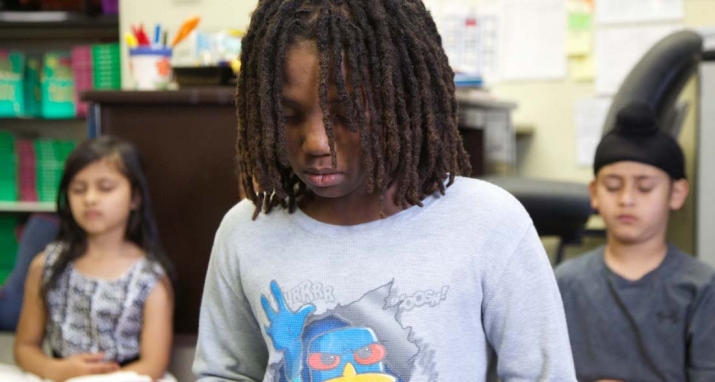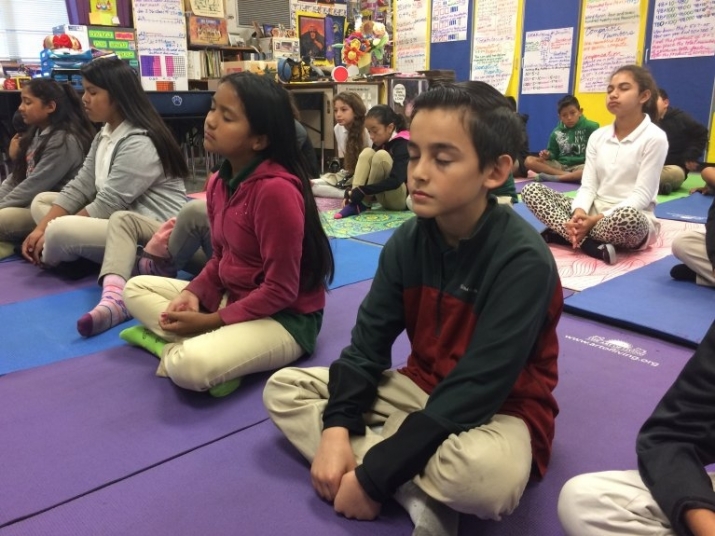NEWS
US Schools that Have Replaced Detention with Meditation Are Reaping the Benefits
 From mindfulschools.org
From mindfulschools.orgThe far-reaching benefits of meditation and mindfulness, as long recognized by many spiritual traditions, are gaining increasing traction in the West, both within and outside the Buddhist world. Perhaps nowhere is this postivie impact being more keenly felt, and with the greatest potential to improve the future, than at the growing number of schools that are incorporating these practices into their daily curriculums.
It is becoming increasingly common to find meditation and mindful-breathing sessions included in educational programs. A recent study by the University of California-Davis and Mindful Schools, a non-profit organization that says it has trained teachers in about 100 countries and has helped some 750,000 students, suggests that such practices have the potential to triple the ability of students to focus on lessons and to participate in class activities.
Michelle Braun-Burget, a school psychologist at Harris Hill Elementary School in Buffalo, New York, began introducing the techniques to students three years ago. “What I’m finding is there are a lot of students even at this age, which is K through fifth grade—five-year-olds to 10- and 11-year-olds—who are anxious and nervous and have trouble focusing.” she said, observing that many of the students now exhibit more self-confidence since adopting the practice. “They’re just more aware of themselves and what makes them upset, what makes them nervous and they have better control now of how to deal with it.” (KSAT 12)
In Baltimore, Maryland, where violent crime and unemployment levels are nearly twice the US national average, a number of public schools are introducing mindfulness and meditation programs to address the significant levels of stress suffered by children from disadvantaged backgrounds, which unaddressed can lead to emotional, behavioral issues, and delinquency.
Instead of punishing misbehaving kids, or handing out detention, Baltimore’s Robert W. Coleman Elementary School has instead set up what it calls a “mindful moment room,” where disruptive students are taught to practice mindful breathing and meditation to instill calm and help them re-center. The school has also adopted twice-a-day yoga and mindfulness practices during school hours for all students.
The techniques teach the students to approach and resolve conflicts peacefully and to mitigate emotional turmoil, providing them with a means of coping with stress and setbacks. As a result of the program, the school’s administrators have observed encouraging changes among the children. “Instead of the students fighting or lashing out, they started to use words to solve their problems,” said Principal Carlillian Thompson.
Introducing mindfulness and meditation techniques at a young age also has the potential to avert a vicious spiral into more serious issues, as the children—especially those from disadvantaged backgrounds—grow older. “Students who are forced out of school for disruptive behavior are usually sent back to the origin of their angst and unhappiness—their home environments or their neighborhoods, which are filled with negative influence,” said PBS journalist Carla Amurao in an analysis. “Those who are forced out for smaller offenses become hardened, confused, embittered. Those who are unnecessarily forced out of school become stigmatized and fall behind in their studies; many eventually decide to drop out of school altogether, and many others commit crimes in their communities.” (PBS)
The first year of the initiative at Robert W. Coleman Elementary brought with it encouraging results: zero suspensions for misbehavior, compared with four suspensions a year earlier. “We see the success rate of those students who began in the program now,” said Principal Thompson. “They are middle school students who are very successful; they come back and participate in the program.” (Newsweek)
 Fifth-graders at Horace Cureton Elementary in San Jose, California, practice meditation. From mercurynews.com
Fifth-graders at Horace Cureton Elementary in San Jose, California, practice meditation. From mercurynews.comThe value of making genuine mindfulness and meditation practices a cornerstone of daily life has been amply demonstrated by thousands of years of spiritual tradition and supported by numerous scientific studies. While these practices cannot address poverty and do not provide a one-size-fits-all panacea for every problem, they can offer a set of tools that enable children to master their inner lives and reshape their responses to challenging circumstances and difficult situations, providing a means to declutter their thought processes, build emotional resilience, and let go of negative thoughts and mindsets.
See more
Meditation Replaces Detention in Baltimore’s Public School, and the Students Are Thriving (Positive News)
THE MOVEMENT OF MEDITATION REPLACING DETENTION IN SCHOOLS (Newsweek)
Faced with outsized stresses, these Baltimore students learn to take a deep breath (PBS)
Fact Sheet: How Bad Is the School-to-Prison Pipeline? (PBS)
Mindfulness, meditation techniques being used in classroom (KSAT 12)
Mindful Schools
Related news from Buddhistdoor Global
Teachers of Buddhism in High Demand at Australian Public Schools
Salesforce Invites Plum Village Monks and Nuns to Annual Conference
Chinese IT Workers Seek Spiritual Solace at Buddhist Monastery
Mindfulness Key to Unplugging Children from Online World, Says British MP
Scientists in Nepal Show the Neurological Benefits of Meditation on Buddhist Monks
Zen Meditation Class at England’s York Minster Draws Ire of Conservative Christians
Buddhist Transitional Community in Pennsylvania Offers Refuge for Former Convicts
Buddhist Temples in China Experience a Surge in Spiritual Seekers
Study Shows Loving-kindness Meditation Reduces Racial Bias
Related features from Buddhistdoor Global
When All Else Fails, Exhale
Why Meditate?
Meditating with the Younger Sangha
Improving the Lives of People with ALS through Mindfulness
Mindful Britain: Building a Happier Country
“We Have All Made Mistakes” - Teaching Mindfulness in Prisons: A Different Kind of Rehabilitation














